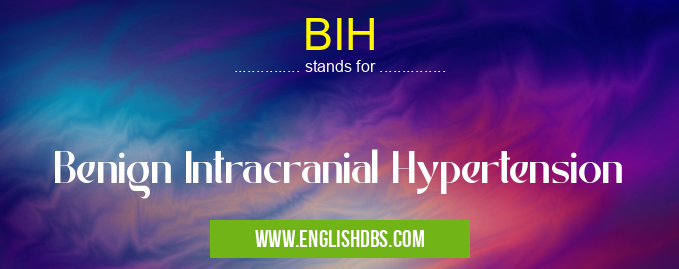What does BIH mean in MEDICAL
BIH, otherwise known as Benign Intracranial Hypertension, is a non-life-threatening neurological disorder that affects the pressure in the brain. People with this condition experience increased pressure in their skull due to an imbalance of cerebrospinal fluid. It can cause many symptoms including: headaches, vertigo, vision problems and ringing in the ears. BIH is usually diagnosed through a series of tests and examinations by a medical professional. Treatment includes medications to reduce the pressure in the brain, lifestyle changes, dietary modifications and possibly surgery if necessary. By understanding what BIH stands for and what it entails, you can better understand how to identify and manage this condition.

BIH meaning in Medical in Medical
BIH mostly used in an acronym Medical in Category Medical that means Benign Intracranial Hypertension
Shorthand: BIH,
Full Form: Benign Intracranial Hypertension
For more information of "Benign Intracranial Hypertension", see the section below.
Symptoms
People with BIH may experience various physical or mental symptoms such as: chronic headaches, ringing in their ears (tinnitus), dizziness or vertigo, nausea or vomiting, blurred vision or double vision, changes in speech or hearing abilities or difficulty concentrating. In addition to these typical symptoms of BIH, some people may also have seizures or sleep disturbances associated with this condition.
Diagnosis
The diagnosis process for BIH typically begins with a review of your medical history and physical examination followed by imaging tests (CT scan/MRI) to assess the amount of pressure inside your skull. A lumbar puncture may also be done to measure the amount of intracranial pressure within your body. Your doctor may also order blood tests to rule out any other underlying causes for your symptoms.
Treatment
Treatment for benign intracranial hypertension generally focuses on reducing the intracranial pressure within your skull through medications such as diuretics and acetazolamide. In addition, lifestyle changes such as diet modifications (low salt diet) and weight loss are often recommended for individuals with this disorder. Surgery may be an option if conservative treatments do not work and the symptoms are particularly severe.
Essential Questions and Answers on Benign Intracranial Hypertension in "MEDICAL»MEDICAL"
What is Benign Intracranial Hypertension?
Benign Intracranial Hypertension, also known as Pseudotumor Cerebri, is a condition that occurs when the pressure inside your skull increases due to an imbalance between the production and absorption of cerebrospinal fluid. This pressure can cause severe headaches, blurred vision, ringing in the ears and dizziness.
What are the symptoms of Benign Intracranial Hypertension?
Symptoms of Benign Intracranial Hypertension include severe headaches, vision problems such as blurred or double vision, loss of peripheral vision, pain behind the eyes when looking up or down, temporary blindness in one eye (optic nerve compression), ringing in the ears (tinnitus), neck and shoulder pain, vertigo and nausea.
What causes Benign Intracranial Hypertension?
The exact cause of Benign Intracranial Hypertension is unknown; however, it is believed to be caused by an imbalance between the production and absorption of cerebrospinal fluid around the brain and spinal cord. Other potential causes include medications such as tetracyclines or vitamin A supplements; obstructions in veins; certain endocrine conditions; head injuries or infections; diseases such as lupus or sarcoidosis; tumours; neurological disorders and obesity.
How is Benign Intracranial Hypertension diagnosed?
Diagnosis for Benign Intracranial Hypertension includes physical examination and imaging tests such as magnetic resonance imaging (MRI) with contrast dye; computed tomography (CT) scan with contrast dye; optical coherence tomography (OCT); lumbar puncture to measure intracranial pressure; visual field testing to evaluate any vision changes; blood tests to check for metabolic disorders or underlying diseases that may contribute to benign intracranial hypertension.
Who is most at risk for developing benign intracranial hypertension?
Those who are obese or overweight have an increased risk for developing benign intracranial hypertension. Women aged 20-50 years old seem to be more likely than men to develop this condition. People taking certain medications such as tetracyclines or vitamin A supplements may also be at higher risk.
What treatments are available for benign intracranial hypertension?
Treatment options which can reduce pressure inside the skull include medications such as acetazolamide which help regulate cerebrospinal fluid production or diuretics which promote increased urination to reduce fluids within the body. In more serious cases a shunt or drainage system may need to be installed in order to relieve pressure from within the skull. Surgery may also be required if other methods fail to reduce the pressure in time.
Final Words:
BIH stands for Benign Intracranial Hypertension – a non-life threatening neurological disorder that affects individuals primarily by increasing cranial pressures inside their skulls due to an imbalance of cerebrospinal fluid production and reabsorption rates within their bodies. It’s important for anyone exhibiting signs of BIH – especially chronic headaches, dizziness or vertigo - to seek help from a medical professional who can provide them with an accurate diagnosis so they can begin appropriate treatment options like medications and lifestyle modifications which will help reduce their symptoms quickly.
BIH also stands for: |
|
| All stands for BIH |
